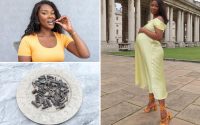I was born without a vaginal opening — that’s how I discovered I’m intersex
Sydney Bean found it odd that she hadn’t started her period by age 17.
But after noticing some light spotting, the Gen Zer eagerly rushed to insert a tampon in anticipation of her inaugural flow. Her excitement, however, immediately turned to shock upon realizing she didn’t have anywhere to place the feminine product.
“I tried to put in a tampon, and then I was like, ‘There’s nowhere to put it?,’” recalled Bean, now 24, from Idaho, in a trending TikTok tell-all, detailing how she ultimately diagnosed herself as intersex — a person who has genitals, chromosomes or reproductive organs that don’t fit into the male or female sex binary.
“When I looked with a mirror I found that I didn’t actually have a vaginal opening,” she continued. “It was an extremely small hole.”
In the clip, which has amassed over 883,000 views, Bean explained that at age 14 she was prescribed medication for polycystic ovary syndrome, or PCOS, to quell her rampant acne and balance her excess growth hormones, including testosterone.
But after discovering her missing vaginal orifice at 17, the concerned blond researched her condition to ultimately find that she was born with a microperforate hymen.
It’s a rare, congenital condition in which the hymen covers the entire vagina, only leaving a small opening, per Cleveland Clinic. Typically, the hymen is a ring-like piece of tissue that surrounds the opening of the vagina but doesn’t completely cover the genitalia.
Bean opted to undergo corrective surgery, which she viewed as a success.
“It felt like I had a proper body,” she recently told Truly’s “Born Different” in a YouTube clip with over 10 million views. “It felt like I was getting closer to the being the female that I was intended to be.”
She’s far from the only woman to go under the knife after discovering her anatomical aberrations.
Devan Mack, a married thirty-something from Georgia, was born with Mayer-Rokitansky-Küster-Hauser syndrome, a congenital disorder that left her without a vaginal canal, cervix and functioning uterus. In 2016, Mack had a “man-made” vagina implanted in effort to become a mom.
Jucilene Marinho, a Brazilian woman born without a vagina, too, underwent a similar surgery in April 2017 at age 23. Specialists gave her an artificial vaginal canal using the skin of tilapia fish.
“At first I was very scared to do it because I thought it would hurt and I was worried it might damage the opening. But it was a wonderful moment because everything worked perfectly,” said Marinho post-op. “There was no pain just a great deal of pleasure and satisfaction.”
And while Bean also enjoyed a measure of contentment following her procedure, she was admittedly disappointed that her doctors failed to diagnose her as intersex.
“I do wish the word ‘intersex’ had been uttered,” she lamented to Truly. “I wish I knew why this was happening. I wish they didn’t treat it as an anomaly.”
Online, Bean went on to reveal that a transgender friend unintentionally mistook her as trans — owing to the similarities in their journeys. But the towhead insisted that she doesn’t identify as someone born with a different gender identity than the sex she was assigned at birth.
“It didn’t make sense to me that I was trans,” she said on TikTok. “I wasn’t a man becoming a woman.”
Bean ultimately found solace under the intersex umbrella, and has since used her social media platform to advocate for the lesser-known designation.
“I think the most important thing that anyone can do when they’re learning about intersex people is to not make assumptions,” she said, noting that the term “hermaphrodite” — an organism having both male and female sex organs or characteristics — is an inaccurate slur used against members of her community.
“Ask questions, do your own research and do it critically,” Bean urged. “Don’t use the word ‘hermaphrodite.’ It’s always be hateful.”


